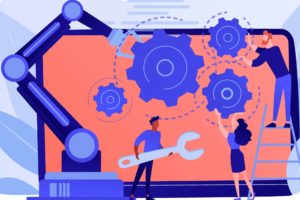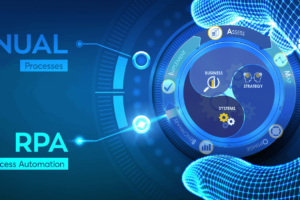The Future of Enterprise AI Platforms
First featured in the 44th Edition of The World Leasing Yearbook 2023
Artificial intelligence (AI) in enterprise platforms is an area of dynamic innovation. When put to work on the right issues, AI is moving beyond the hype and delivering business value by evolving products, services and solutions. Many organisations see the adoption of AI as critical to their long-term success; to remain competitive, they are turning to artificial intelligence to uncover insights from the vast volumes of data they have available. Accenture noted in a recent survey that nearly 75% of companies have already integrated AI into their business strategies.
What is Enterprise AI?
AI is present in our daily lives. The most visible manifestations are the rise of virtual assistants like Apple’s Siri, Amazon’s Alexa, Google Assistant and Microsoft Cortana, or the recommendation systems used by streaming platforms like Netflix or Spotify. But what does AI mean in the context of enterprise platforms? Let’s start with some definitions.
John McCarthy, a professor emeritus of computer science at Stanford, coined the term “artificial intelligence” in 1955, proposing that ‘every aspect of learning or any other feature of intelligence can in principle be so precisely described that a machine can be made to simulate it.’
AI is an umbrella term that encompasses machine learning (ML), deep learning (DL), neural networks (NN), natural language processing (NLP) and computer vision. AI and ML are often used interchangeably, but there are differences. AI mimics human cognitive functions such as learning and problem-solving and uses maths and logic to simulate the reasoning people use to learn from new information and make decisions. ML is a subset of AI, focused on building systems that solve specific tasks by learning from the data they consume and making predictions. This means that all machine learning is AI, but not all AI is machine learning.
Enterprise AI generally focuses on addressing specific use cases at a company-wide scale, where the data needed to train the AI is specific to that organisation and industry, like in the case of automating customer onboarding processes. Enterprise AI accelerates and scales digital transformation, automates business processes, improves data-driven decision-making, and produces better insights. According to Gartner projections, the AI software market is set to grow by 21% in 2022.

Which Areas of AI and ML Are Adding More Value Today?
Many organisations recognise the imperative to get in the game and start or expand the deployment of these transformational technologies. According to Gartner, 60% of B2B sales organisations will transition from experience- and intuition-based selling to data-driven selling, merging their sales process, applications, data and analytics into a single operational practice. When asked which technologies most improve customer experience, 34% of sales and marketing leaders believe AI is the biggest game-changer.
AI-powered solutions are being used to unlock growth opportunities, reduce operating costs, and automate business processes. As explained above, enterprise AI enables digital transformation. Significant opportunities for innovation lie in applying AI to reimagine business processes that can dramatically improve how companies engage with customers and improve business operations.
By analysing how AI is implemented today, we can better understand what to expect from this technology and how businesses can harness its power. The widespread use of AI in business is limited but use cases for AI in banking and financial services are numerous. These are some of the areas where AI shows great potential:
- Automating customer onboarding by using optical character recognition (OCR) and robotic process automation (RPA)
- Personalised experience using AI assistants, such as chatbots, to give customers personalised advice and use natural language processing to provide instant, self-help customer service
- Applying ML and AI to data-driven areas such as lending processes and credit decisions to increase efficiency and data quality
- Fraud and cybercrime prevention. AI cybersecurity systems can automatically detect threats and anomalous behaviour, find hidden attackers, speed up investigations after an attack, and even find out which information has been compromised

AI Is Here To Stay
Organisations recognise the potential of AI technologies and the critical transformational effect on their operations, sales processes and customer experience. A new Grand View Research report shows that the global enterprise artificial intelligence market is expected to reach USD 155.2 billion by 2030. Although the COVID-19 pandemic severely impacted every sector worldwide, the enterprise AI market experienced growth due to the increased demand for advanced and creative AI-based enterprise products across several sectors. The key factors boosting the enterprise AI market include growing demand for virtual assistants, chatbots and robots and the increasing need to analyse exponentially growing demand for data sets worldwide. Several AI service providers are innovating and developing new products and services by collaborating with government institutes and R&D departments to fulfil the growing demand for AI in the market.
But what about the challenges of scaling AI? According to a McKinsey report released at the end of 2021, one factor that distinguishes companies that get the biggest earnings boost from AI is their use of MLOps (machine learning operations). MLOps is a tech stack and set of processes which allow deploying AI models in a faster and more cost-effective way. The report discusses the importance of a comprehensive focus on the end-to-end ML lifecycle instead of only focusing on model development or prototyping. Operationalising AI at scale across the organisation underpins success while also spending more efficiently on AI, taking advantage of cloud technologies, and engaging in various activities to mitigate AI-related risks. Risk management is an area that continues to be a shortcoming for many companies’ AI efforts, and cybersecurity remains the most recognised risk. AI high performers are more likely than other organisations to engage in risk-mitigation practices related to model documentation, data validation, and checks on bias.
But as with any new technology, there are challenges to successful adoption. Some potential obstacles to unleashing the value of AI involve preparing company and customer data for AI. According to Appen’s 2022 State of AI report, enterprise leaders allocate 58% of their AI budget to the data sourcing and preparation stages. Privacy concerns and the ability to manage large AI projects also surface as main challenges. Preparing your data for AI requires significant expertise. But another recurring issue for AI adopters is the lack of qualified skills to get the most out of tools. Companies are struggling to find, attract and retain the talent needed to carry out AI programs.
How to Succeed in Your AI-Driven Innovation Journey
Many asset finance and leasing companies are looking to deploy automation and AI solutions, known as intelligent automation, to optimise business processes, achieve efficiency gains, and support decision-making by extracting new insights from complex data.

With automation and other process reengineering measures, organisations can achieve improvements that free up time to engage in more value-adding activities. As organisations look to expand the use of these technologies through embedding AI, they are also exposing themselves to greater risks. To drive technological and strategic decisions across the organisations we support in their innovation journeys, we use the AMOBI methodology.
The AMOBI methodology is an iterative framework based on the concept of continuous improvement. This proprietary AMOBI methodology not only shows you how to simplify and automate processes but also how to reduce risks systematically. It enables a structured, templated approach to assess initial requirements using root cause assessment, mapping, and optimising processes to identify manual or system bottlenecks, comparing the proposed optimisations to the expected benchmark and implementing successful optimisations. The AMOBI phases are a fundamental step in successfully adopting new technology. The AMOBI stages are: Assess, Map, Optimise, Benchmark, and Implement.

In the case of looking at intelligent automation for repetitive tasks, the AMOBI methodology helps to avoid prematurely choosing technology solution(s) and then finding out another part of your business is impacted along the way because either the processes were not mapped beforehand or tested and acted upon. AMOBI forces you to take a step back and take a holistic approach to the processes you want to automate, the organisation and the systems in place.
With the right mix of talent, a sound strategy for deploying AI, and a proven methodology for ensuring robust processes and clean and trusted data, your organisation can capitalise on the rich promise of AI.
References:
https://www.gartner.com/en/newsroom/press-releases/2022-08-10-gartner-identifies-key-emerging-technologies-expanding-immersive-experiences-accelerating-ai-automation-and-optimizing-technologist-delivery
https://www.grandviewresearch.com/industry-analysis/enterprise-artificial-intelligence-market-report
https://www.mckinsey.com/business-functions/quantumblack/our-insights/scaling-ai-like-a-tech-native-the-ceos-role
https://www.mckinsey.com/business-functions/quantumblack/our-insights/global-survey-the-state-of-ai-in-2021
https://www.zdnet.com/article/what-is-ai-heres-everything-you-need-to-know-about-artificial-intelligence/
https://www.accenture.com/us-en/insights/artificial-intelligence/ai-maturity-and-transformation
https://news.stanford.edu/news/2011/october/john-mccarthy-obit-102511.html
https://venturebeat.com/ai/10-top-artificial-intelligence-solutions-in-2022/#h-what-is-artificial-intelligence-ai-software
https://emtemp.gcom.cloud/ngw/globalassets/en/sales-service/documents/trends/future_of_sales_ebook.pdf
https://www.semrush.com/blog/artificial-intelligence-stats/
https://appen.com/stateofai2022/








